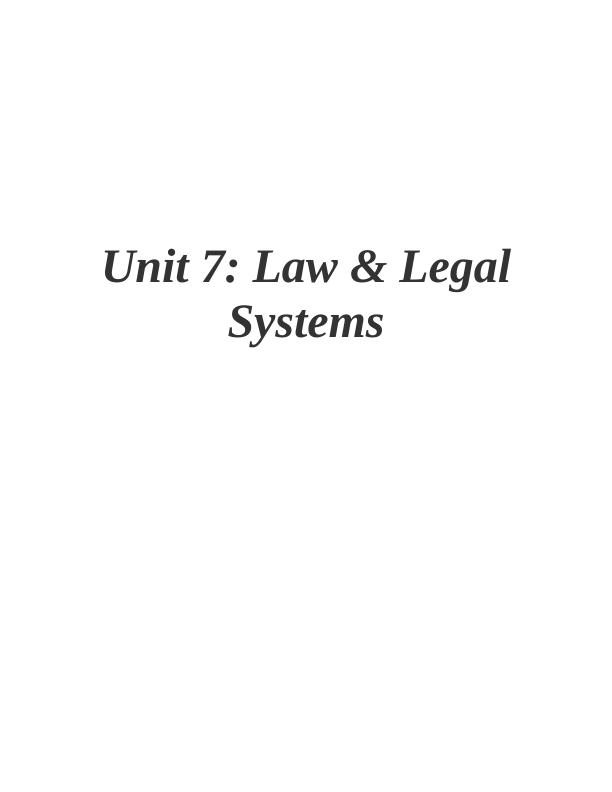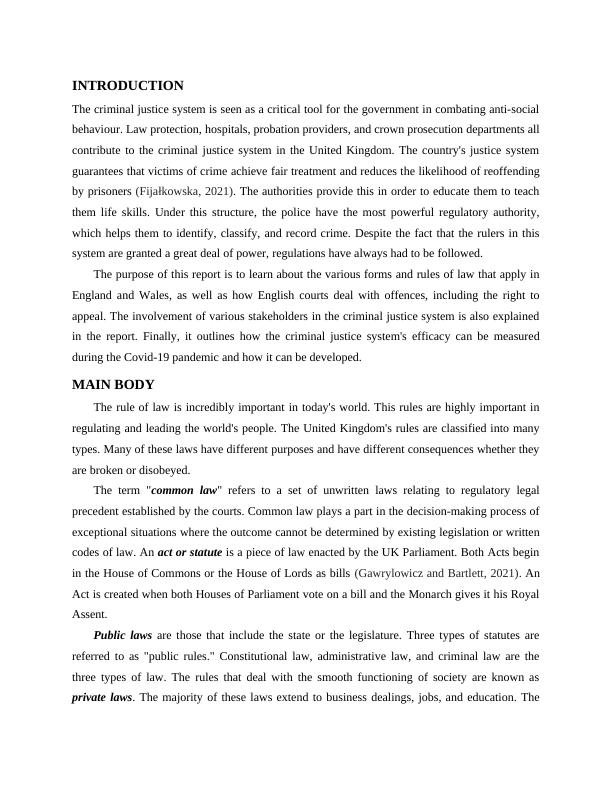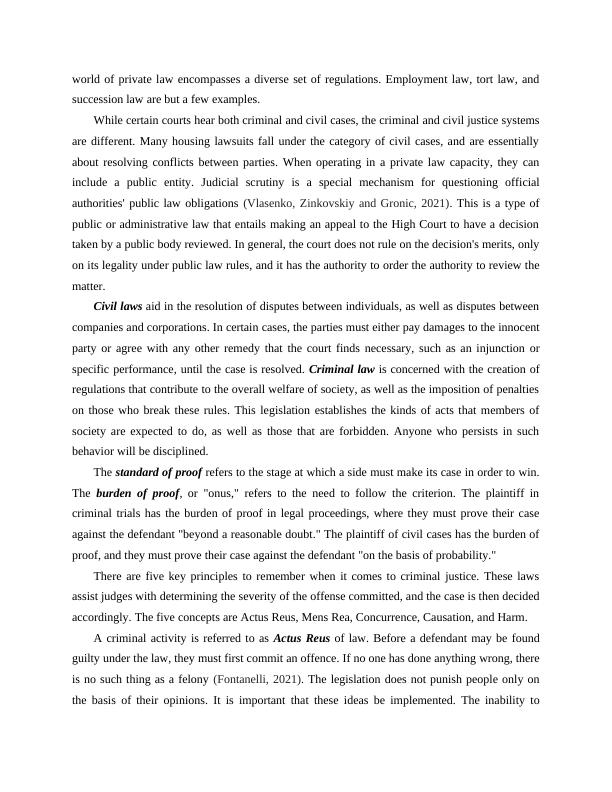Law & Legal Systems: Types of Law, Courts, and Criminal Justice System
Added on 2022-12-15
11 Pages4440 Words62 Views
Unit 7: Law & Legal
Systems
Systems

Table of Contents
INTRODUCTION...........................................................................................................................3
MAIN BODY..................................................................................................................................3
CONCLUSION..............................................................................................................................10
REFERENCES..............................................................................................................................11
INTRODUCTION...........................................................................................................................3
MAIN BODY..................................................................................................................................3
CONCLUSION..............................................................................................................................10
REFERENCES..............................................................................................................................11

INTRODUCTION
The criminal justice system is seen as a critical tool for the government in combating anti-social
behaviour. Law protection, hospitals, probation providers, and crown prosecution departments all
contribute to the criminal justice system in the United Kingdom. The country's justice system
guarantees that victims of crime achieve fair treatment and reduces the likelihood of reoffending
by prisoners (Fijałkowska, 2021). The authorities provide this in order to educate them to teach
them life skills. Under this structure, the police have the most powerful regulatory authority,
which helps them to identify, classify, and record crime. Despite the fact that the rulers in this
system are granted a great deal of power, regulations have always had to be followed.
The purpose of this report is to learn about the various forms and rules of law that apply in
England and Wales, as well as how English courts deal with offences, including the right to
appeal. The involvement of various stakeholders in the criminal justice system is also explained
in the report. Finally, it outlines how the criminal justice system's efficacy can be measured
during the Covid-19 pandemic and how it can be developed.
MAIN BODY
The rule of law is incredibly important in today's world. This rules are highly important in
regulating and leading the world's people. The United Kingdom's rules are classified into many
types. Many of these laws have different purposes and have different consequences whether they
are broken or disobeyed.
The term "common law" refers to a set of unwritten laws relating to regulatory legal
precedent established by the courts. Common law plays a part in the decision-making process of
exceptional situations where the outcome cannot be determined by existing legislation or written
codes of law. An act or statute is a piece of law enacted by the UK Parliament. Both Acts begin
in the House of Commons or the House of Lords as bills (Gawrylowicz and Bartlett, 2021). An
Act is created when both Houses of Parliament vote on a bill and the Monarch gives it his Royal
Assent.
Public laws are those that include the state or the legislature. Three types of statutes are
referred to as "public rules." Constitutional law, administrative law, and criminal law are the
three types of law. The rules that deal with the smooth functioning of society are known as
private laws. The majority of these laws extend to business dealings, jobs, and education. The
The criminal justice system is seen as a critical tool for the government in combating anti-social
behaviour. Law protection, hospitals, probation providers, and crown prosecution departments all
contribute to the criminal justice system in the United Kingdom. The country's justice system
guarantees that victims of crime achieve fair treatment and reduces the likelihood of reoffending
by prisoners (Fijałkowska, 2021). The authorities provide this in order to educate them to teach
them life skills. Under this structure, the police have the most powerful regulatory authority,
which helps them to identify, classify, and record crime. Despite the fact that the rulers in this
system are granted a great deal of power, regulations have always had to be followed.
The purpose of this report is to learn about the various forms and rules of law that apply in
England and Wales, as well as how English courts deal with offences, including the right to
appeal. The involvement of various stakeholders in the criminal justice system is also explained
in the report. Finally, it outlines how the criminal justice system's efficacy can be measured
during the Covid-19 pandemic and how it can be developed.
MAIN BODY
The rule of law is incredibly important in today's world. This rules are highly important in
regulating and leading the world's people. The United Kingdom's rules are classified into many
types. Many of these laws have different purposes and have different consequences whether they
are broken or disobeyed.
The term "common law" refers to a set of unwritten laws relating to regulatory legal
precedent established by the courts. Common law plays a part in the decision-making process of
exceptional situations where the outcome cannot be determined by existing legislation or written
codes of law. An act or statute is a piece of law enacted by the UK Parliament. Both Acts begin
in the House of Commons or the House of Lords as bills (Gawrylowicz and Bartlett, 2021). An
Act is created when both Houses of Parliament vote on a bill and the Monarch gives it his Royal
Assent.
Public laws are those that include the state or the legislature. Three types of statutes are
referred to as "public rules." Constitutional law, administrative law, and criminal law are the
three types of law. The rules that deal with the smooth functioning of society are known as
private laws. The majority of these laws extend to business dealings, jobs, and education. The

world of private law encompasses a diverse set of regulations. Employment law, tort law, and
succession law are but a few examples.
While certain courts hear both criminal and civil cases, the criminal and civil justice systems
are different. Many housing lawsuits fall under the category of civil cases, and are essentially
about resolving conflicts between parties. When operating in a private law capacity, they can
include a public entity. Judicial scrutiny is a special mechanism for questioning official
authorities' public law obligations (Vlasenko, Zinkovskiy and Gronic, 2021). This is a type of
public or administrative law that entails making an appeal to the High Court to have a decision
taken by a public body reviewed. In general, the court does not rule on the decision's merits, only
on its legality under public law rules, and it has the authority to order the authority to review the
matter.
Civil laws aid in the resolution of disputes between individuals, as well as disputes between
companies and corporations. In certain cases, the parties must either pay damages to the innocent
party or agree with any other remedy that the court finds necessary, such as an injunction or
specific performance, until the case is resolved. Criminal law is concerned with the creation of
regulations that contribute to the overall welfare of society, as well as the imposition of penalties
on those who break these rules. This legislation establishes the kinds of acts that members of
society are expected to do, as well as those that are forbidden. Anyone who persists in such
behavior will be disciplined.
The standard of proof refers to the stage at which a side must make its case in order to win.
The burden of proof, or "onus," refers to the need to follow the criterion. The plaintiff in
criminal trials has the burden of proof in legal proceedings, where they must prove their case
against the defendant "beyond a reasonable doubt." The plaintiff of civil cases has the burden of
proof, and they must prove their case against the defendant "on the basis of probability."
There are five key principles to remember when it comes to criminal justice. These laws
assist judges with determining the severity of the offense committed, and the case is then decided
accordingly. The five concepts are Actus Reus, Mens Rea, Concurrence, Causation, and Harm.
A criminal activity is referred to as Actus Reus of law. Before a defendant may be found
guilty under the law, they must first commit an offence. If no one has done anything wrong, there
is no such thing as a felony (Fontanelli, 2021). The legislation does not punish people only on
the basis of their opinions. It is important that these ideas be implemented. The inability to
succession law are but a few examples.
While certain courts hear both criminal and civil cases, the criminal and civil justice systems
are different. Many housing lawsuits fall under the category of civil cases, and are essentially
about resolving conflicts between parties. When operating in a private law capacity, they can
include a public entity. Judicial scrutiny is a special mechanism for questioning official
authorities' public law obligations (Vlasenko, Zinkovskiy and Gronic, 2021). This is a type of
public or administrative law that entails making an appeal to the High Court to have a decision
taken by a public body reviewed. In general, the court does not rule on the decision's merits, only
on its legality under public law rules, and it has the authority to order the authority to review the
matter.
Civil laws aid in the resolution of disputes between individuals, as well as disputes between
companies and corporations. In certain cases, the parties must either pay damages to the innocent
party or agree with any other remedy that the court finds necessary, such as an injunction or
specific performance, until the case is resolved. Criminal law is concerned with the creation of
regulations that contribute to the overall welfare of society, as well as the imposition of penalties
on those who break these rules. This legislation establishes the kinds of acts that members of
society are expected to do, as well as those that are forbidden. Anyone who persists in such
behavior will be disciplined.
The standard of proof refers to the stage at which a side must make its case in order to win.
The burden of proof, or "onus," refers to the need to follow the criterion. The plaintiff in
criminal trials has the burden of proof in legal proceedings, where they must prove their case
against the defendant "beyond a reasonable doubt." The plaintiff of civil cases has the burden of
proof, and they must prove their case against the defendant "on the basis of probability."
There are five key principles to remember when it comes to criminal justice. These laws
assist judges with determining the severity of the offense committed, and the case is then decided
accordingly. The five concepts are Actus Reus, Mens Rea, Concurrence, Causation, and Harm.
A criminal activity is referred to as Actus Reus of law. Before a defendant may be found
guilty under the law, they must first commit an offence. If no one has done anything wrong, there
is no such thing as a felony (Fontanelli, 2021). The legislation does not punish people only on
the basis of their opinions. It is important that these ideas be implemented. The inability to

End of preview
Want to access all the pages? Upload your documents or become a member.
Related Documents
The UK Legal System: Sources of Laws and Aspects of Contract Law, Law of Tort, and Employment Lawlg...
|7
|2544
|134
Legal Systems of Europelg...
|7
|1591
|15
Law & Legal Systems: Criminal Justice System in the UKlg...
|9
|3105
|85
Understanding English Law: Statutes, Case Laws, and Alternative Dispute Resolutionlg...
|5
|1404
|280
UK Classification of Laws and Source of Law: Impact on Multilingual Organizations and Contract Lawlg...
|10
|2200
|221
Business Law Act Assignmentlg...
|12
|4119
|35
